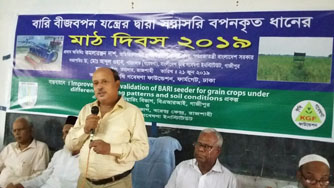RAJSHAHI, June 22, 2019 (BSS)- Direct Seeded Rice (DSR) farming process has reduced production cost to 45 to 50 percent than the conventional system in Barind area thanks to the blessings of farm mechanization.
“We have found the optimistic result in demonstration plots of some grain crops including Aush paddy in the area,” said Dr Arshadul Haque, Senior Scientific Officer (SSO) of Bangladesh Agriculture Research Institute (BARI), adding that DSR rice cultivation by BARI seeder requires Taka 4,500 per bigha against the conventional method’s Taka 8,000.
Dr Haque, SSO of Farm Machinery and Postharvest Process (FMP) Engineering Division, revealed this while illustrating the salient feature of the method at a field day styled “Direct Seeded Aush Rice Fields Sown by BARI Seeder” at Dubuil village under Tanore upazila in the district yesterday.
FMP Engineering Division and On Farm Research Division (OFRD) jointly organized the programme in association with Krishi Gobeshona Foundation under its ‘Improvement and Validation of BARI Seeder for Grain Crops under different Cropping Patterns and Soil Condition Project’.
Additional Secretary (Research) of the Ministry of Agriculture Kamala Ranjan Das addressed the meeting as chief guest while Director (Research) of BARI Dr Abdul Wahab was in the chair.
Director General of Bangladesh Sugar Crop Research Institute Dr Amzad Hossain and its Director (Research) Dr Samajit Kumar Paul, Chief Scientific Officer and Head of FMP Engineering Division Dr Ayub Hossain, Chief Scientific Officer of Bangladesh Rice Research Institute Dr Aminul Islam and Deputy Director of Department of Agriculture Extension Shamsul Haque also spoke.
Disseminating his expertise on the issue OFRD Senior Scientific Officer Dr Shakhawat Hossain told the meeting that there are enormous scopes of growing Aush rice in between Rabi crops and Transplanted Aman paddy as there are some Aus varieties like BINA dhan 19 and BRRI dhan 62 which require less water. Some farmers of this region cultivated these Aush rice as direct seeded broadcasted rice.
He adds large-scale promotion of the method can be the vital means of mitigating some of the existing problems like shortage of irrigation water and labour in the vast Barind tract.
Dr Hossain identically opined that the region’s agriculture is facing many challenges including climate change, labour shortage, irrigation water scarcity and increase in crop cultivation cost. So, promotion of farm mechanization has become indispensable to address the multiple problems.
In his remarks, Kamala Ranjan Das called for promotion of field-level farm mechanization to boost crop outputs to feed the gradually increasing population mentioning that large-scale adoption of farm mechanization can be the effective means in facing the existing agriculture related challenges in the drought-prone Barind area.
He mentioned that the cropping intensity can be increased to 250 percent even 400 percent from the existing 200 percent through reducing the existing time gap between the two crops after the best uses of the farm mechanization.
All the officials and others concerned including the scientists and farmers should put in their level best efforts and work together as the present government is very much positive towards the field.
More than 150 farmers both male and female and other officials, scientists and researchers concerned joined the programme.



